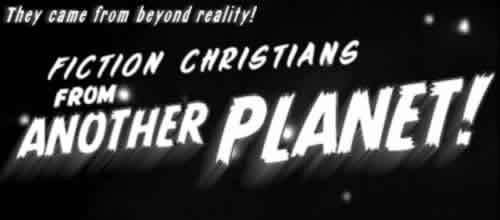Fiction Christians From Another Planet! II: The Blind Ones
Why do many characters in Christian novels have little regard for God’s “novel,” the Bible?
Replacing humble yet robust love for God’s self-revelation, novel scenes may read like this:
“You can’t spend all your life ignoring God, Jim,” Thomas said. “You just need to believe.”
Jim knew that Thomas was right. Even more, he knew that he had been given much love throughout his life. To think that someone even greater than his own parents could love him like this was a nice thought. Imagine the world’s creator loving him. But Jim would need more than that. It wouldn’t do to accept the kind of blind faith these people had. He needed some kind of evidence or logic, something he could see, before accepting any belief in God.
— Original dialogue, based on that of an actual Christian contemporary/speculative novel
 This is one alien belief of the invasive Christian novel-character “Child-People” I introduced last week: exclusive promotion that is not simply of childlike trust to believe in Christ’s own words about Himself, but of blind faith that God exists, loves, and/or saves.
This is one alien belief of the invasive Christian novel-character “Child-People” I introduced last week: exclusive promotion that is not simply of childlike trust to believe in Christ’s own words about Himself, but of blind faith that God exists, loves, and/or saves.
As if real Christians have not historically accepted various emphases and reasons for faith.
As if God Himself didn’t give more motives for faith: rewards, eternal life, escaping slavery to sin, defeating the Devil, and moreover, Himself. As if the Bible, God’s Story, did not exist.
After reading one novel’s example of this trope, I tapped out the following e-reader note:
Right. It’s not [enough]. Not this kind of “blind faith.” Why focus on [blind faith, or else a spiritual-quest MacGuffin] when at least some emphasis on the Bible and why Christians believe it would make the story more realistic? Why must the Bible be barely mentioned?
 I could say this is a Fiction Christian from Another Planet, and stop. We both know I won’t.
I could say this is a Fiction Christian from Another Planet, and stop. We both know I won’t.
It’s easier to understand this perspective in real people. Even after Christ has declared His people righteous and sent His Spirit to start changing them, we’re flawed. We get distracted by other things. Even when we are reading God’s Story, we get things wrong. We base beliefs on overreactions. We invent theology systems apart from His theology.
But the problem doesn’t stop with characters simply ignoring His Word and viewing only “blind faith” as key to believe in God. Novelists even extol them as mature heroes, rather than at worst simpletons, or at best well-meaning “baby Christians” who are still growing.
Understand, I’m not condemning all Christian novels for presenting this view. Only some.
Also, I do not mean to devalue the fact that we do exercise a “childlike” dependence on God. But Biblically, this is not the same as naïve repetition of traditions or tropes such as “you just need to believe” or “seeing isn’t believing” or other phrases frequently used in holiday movies to defend the existence and love not of God, but of Santa Claus. Alas, in some novels these slogans are all I see from characters whom the story upholds as mature Christians.
So why do some authors adore characters who have wide, naïve, alien-like, unseeing eyes?
You can likely think of some reasons beyond a mere problem-diagnosis. Here I’ll give a few:
1. “Blind faith” is a proven controversy shield.
 Let’s say I wrote a novel in which the main character started off as a silly-minded Christian but came to deeper faith — and later, thrilling action-adventures in a perilous overseas mission field — after he got ahold of thick books of well-argued Christian doctrine and systematic theology. Readers would go on red alert. Which doctrines? Which authors? Which (gasp!) church denominations? Too many Christians wish to avoid other doctrines or churches, so few authors or publishers will mention them. “Blind faith” is an easy out.
Let’s say I wrote a novel in which the main character started off as a silly-minded Christian but came to deeper faith — and later, thrilling action-adventures in a perilous overseas mission field — after he got ahold of thick books of well-argued Christian doctrine and systematic theology. Readers would go on red alert. Which doctrines? Which authors? Which (gasp!) church denominations? Too many Christians wish to avoid other doctrines or churches, so few authors or publishers will mention them. “Blind faith” is an easy out.
 2. It’s close to an untouchable trope.
2. It’s close to an untouchable trope.
Every Christian knows Jesus endorsed childlike faith in some way. If you repeat that belief in any form, few would disagree without coming across as cranks like myself. Oh, so you say that Jesus was wrong? No, I would say that Christ taught many other things besides “come to Me like a child” — and He never once said, “come like a child and stay that way.” In fact, much of what He said, and what His apostles said and wrote, taught the exact opposite.
3. Maybe authors simply haven’t met or learned from other sorts of Christians.
“I believe in a Person, not doctrine”/“I just believe”/“Just let go and let God” all sound very spiritual, and they have some truth to them. If you’re an author trained to try to make your stories very spiritual, it makes sense to include the most “spiritual” slogans and beliefs that you know. And if you’ve only encountered — or seen as heroic — blind-faith-minded people in your life, Christian heroes in your story will naturally sound like those people.
But other Christians exist who emphasize the authority of the Bible, the need to believe it with childlike delight but also a Christlike mind, and the need for organized truth — in real life, not apart from real life, just as blood isn’t carried in a bucket but lets the body live.
Let’s see more of those kinds of characters, for God’s sake (and the sake of realism)!
Blind-faith characters can stay. They need to remind us that Christianity isn’t all reading and logic. But I’d be happy to meet more I-believe-because-of-the-Bible heroes in fiction.











































It’s really interesting to read this post in conjunction with Mike Duran’s post about that one comic book writer thinking that superheroes represent a move toward pantheism. http://mikeduran.com/2013/01/gods-help-us/
(I think it’s a sign the dude has been writing comic books too long, but that’s neither here nor there.)
So, on one hand we have the touchy feelly Christian authors who don’t really know this Jesus they’re writing about. On the other hand, we have the Godless people who are so desperate to worship anything, they’ll worship a pantheon and the environment. (But haven’t human beings always worshiped those things?)
It’s just amusing to see our educated, scientific culture moving backward. Or maybe sad, because Christianity is what brought us our educated scientific culture. Are we eagerly plunging toward the dystopian world we’ve been writing about for so long?
Nah. I think Morrison’s always been into pantheism. He’s steeped in the occult too.
I love this, Stephen – also, Kessie, your comment. You say it all so well, there’s little to comment on. But we both know I will (ha ha).
I believe the kind of Christianity that’s portrayed in these stories is, unfortunately, what too many in churches believe in. It’s a touchy-feely religion insulated by warm fuzzies from the cold, hard, unyielding truths of the scripture.
Probably another reason is politeness, the unwillingness to offend. But it’s interesting that when Jesus was met with proud, unyielding types (and the world still has plenty of those), He didn’t talk grace to them; he talked about the Law and how they failed to live up to it. He reserved the message of grace for the broken. I’m not saying we should be preaching fire & brimstone out there; I’m saying we need to tell the truth like Jesus did, even when it hurts.
Exactly — because only when people were broken by the fact that they had violated the loving Law of God from the Old Testament would they be open to grace.
Only when we first see the depth of our darkness does His light move us to tears.
Surely adding more of this to Christian novels will make them also more moving, not less. But the trope that “law is always bad” or “doctrine kills” is hideously pervasive.
“Doctrine kills” is a trope? Hm. I wonder if that’s the thing that will get me angry enough to write a proper novel…
Knowledge without love is heartless, true. But love without knowledge is mindless.
My definition of “faith” is trusting someone else’s logic above your own. Faith has evidence. Faith has to have evidence. If you have faith in a person, it’s because he or she has demonstrated that they are trustworthy, even if it’s just in a small way. If they’re trustworthy, you’ll have the faith to do whatever they say, even if they tell you to jump off a cliff. Because you have faith that this person is the kind of person who wouldn’t tell you to jump off a cliff unless they knew you’d be okay.
Amen, and amen! To me, this point is the crux of the matter on a lot of issues in the larger faith fiction community; to wit, we pretend like all Christians agree on everything. People don’t argue in the community of faith: it’s only strawmen in the forms of “hypocrites” or “unbelievers” who courageous Christians have to convert to the “one true way.”
The problem is, this “polite” fiction bares little resemblance to reality. It’s the same annoyance I have with all Christian characters in novels attending mega churches (or tiny nondenominationals making a stand against mega churches). No one wants to talk about all those little “details,” details that have divided brothers and sisters in faith for generations: predestination, transubstantiation, an age of accountability, pacifism. The list could go on and on.
I would love some day to read about two characters who go to different churches (of recognizable denominations) have an honest conversation about matters of belief. Sort of like how we all do all the time.
Christians are not zombies. We should stop pretending like we are.
Michelle, how did you know that Episode V will likely be called Monster Straw Men?
In fact, you’ve very nearly named a total of three upcoming installments of this little bad B-movie serial. All these difficulties, after all, do interrelate.
Also, speaking of subpar art, I corrected Readers go would to Readers would go. 😀
Stephen, I’d be interested to see this series packaged into a single PDF (or some form of e-book) once it is complete. Great topic, and a fun approach!
“I would love some day to read about two characters who go to different churches (of recognizable denominations) have an honest conversation about matters of belief. Sort of like how we all do all the time.”
If you ever find that book, it will be self-pubbed.
You are so right, Yvonne!
Starfire has Christians of different theological persuasions in it, which I thought was interesting. OK, they’re not recogniseable denominations, because all the characters are dinosaurs…
Indeed! Author Stuart Stockton (who helped begin Speculative Faith version 1.0) was writing about a Dinosaur Soldier before the concept became more popular.
Okay, so a lot of Christian novels uphold characters who “just believe” without good reasons for believing. I can understand that. Christian writers should show them struggling earnestly with their faith, showing the reasons that those characters personally need to believe.
I don’t understand how depicting the Bible necessarily helps in this. For fantasies with secondary worlds, I think having an other-world Bible can often be cliche and cheesy. Also, the vague “I just believe” sentiment can be extended to the Bible. There is probably a lot to commend the statement, “The Bible says it, and I believe it, and that’s that.” However, sentiments like that cause a lot of bad things. That sentiment causes controversy among Christians, because we have different theological interpretations of the Bible, and we all think that the Bible “just says” what we think it says. Also, that sentiment makes unbelievers think that we are stubborn and ignorant, believing myths for no other reason than because they are written in some old book, our minds closed to any objective searching of the truth.
I think characters need to struggle earnestly for truth, and that helps us in our own existential seeking and suffering. I do not believe that anyone will ever find complete truth apart from the Bible (certainly not in opposition to it). However, the Bible was revealed to us. It’s part of our world, and it may or may not be directly relevant to the worlds of speculative fiction. Even when it is directly relevant in fiction, the Bible only expresses truths that I believe the characters also need to work out personally.
To some extent I’m basing this discussion on fantasy that relates to the real world. Christian high fantasy, the entirely-separate-worlds variety, could be different.
Yet the problem would be the same: having a story’s Christian/fantasy-world-Christian-equivalent heroes limited to blind-faith types.
Still, to clarify, let me modify a paragraph from episode I:
And note that when I refer to “the Bible” in this column, and throughout this new serial, I also cover any fantasy-universe equivalents. The Book of Light, the ancient legends, the Grand Mythology, The Traditions of Old, the holy precepts, the Sacred Scroll of Remembrance, The Skyborne Message, founding documents, Edicts of the King — whatever authoritative person or source that functions as the world’s “Bible.”
A hearty amen to this post and also most of the comments! I get really tired of the desperate, “Just believe!” from characters that are supposed to be religious or are the token Christians of the story. To me, that speaks of weak or insincere believers, the ones who only attend church on big holidays, or people who are yearning for some meaning to their lives but don’t actually want to study and understand God’s word, and pick and choose the nice parts and happy promises and ignore the rest.
I liked Michelle R. Wood’s comment about how she’d like to read a book with characters who are different denominations. 🙂 I actually try to do that with my books – sometimes it’s not obvious because doctrine won’t necessarily come up during the story (and obviously not all stories are set in this world), but I do create many of my characters that way because that’s my experience! I have good friends who are mainstream evangelicals, friends who are Baptists, friends who are Presbyterian (my denomination). I hate to see Christians of different denominations bickering and judging each other, so I like to write stories portraying friendship between them. 🙂
The denomination thing is funny…growing up, I had mostly friends from my denomination (Baptist of the Scandinavian variety) and a few Assembly of God kids at school. And in three years of roommates at a Christmas school, I’ve had 1 Assembly of God, one Catholic, and one Baptist, plus three that I couldn’t say for sure. I’m actually attending an E-Free right now, but it feels a lot like my own denomination. It’s interesting to see the differences between denominations, especially with the Holy Spirit.
@Galadriel: I know the feeling! I’m Mennonite, one of my dearest friends is Lutheran, and we’re both excited because a mutual, Mormon friend is coming to my church this weekend.
Some problems I see:
1. It requires a lot of explanation. The reason why denominations differ from each other can be surprisingly subtle, and due not only to belief, but history. They can differ on only a few points, or differ radically on many. If you’re writing an action-thriller, you might find it hard to link a spirited discussion on two characters about whether or not Christ is really present in the Eucharist.
2. It’s also easier for writers to screw up. One of the things I have noticed in the Christian spec-fic blogosphere is than many male writers also tend to be pastors, priests, theology students, or involved directly in that aspect of the faith. A lot of us aren’t. At best, we are educated laymen, and even with research, we may not get certain aspects of theology correct.
Also, bad apologetics can actually harm the enjoyment of a book for many people.
3. If it’s a conversion story, they simply aren’t going to be that deep in the Bible depending on the character. An analogy, if you are drowning and someone pulls you out of the water into a boat, you’re not really going to begin to get to know your rescuer till you are safe. Some characters may need convincing more than rescuing, but I think why we see so much “blind faith” in books is that they show the details most vital to the plot, and a full treatise on the Word may be counterproductive if the goal is showing conversion. As in the “blocks of explanation” I referred to earlier.
4. Some differences people aren’t going to like. Michelle Wood mentions predestination. I don’t think you can discuss this easily, even in novel form. George MacDonald was a Christian Universalist, someone who believes that Jesus’s sacrifice saved everyone, and one of his books indicated that even Lilith, the first wife of Adam, could be so. There’s speaking in tongues, and other charismatic practices many evangelicals would look askew at. Reformed churches sometimes feel almost like they are on different planets from the rest of us. Be careful what you wish for, I guess.
I’m not saying you can’t break all these worries to pieces with a finely crafted novel, but there are dangers I could see.
Great friendly rebuttal, D.M.; I shall friendly-rebut right back, starting with your final line, that a well-written novel could be the only rebuttal needed. The best major-published example I’ve read of mature Christians, of varying denominations, proving to be heroic may be The Visitation by Frank Peretti. Gone are “community churches” of the Darkness novels, and in their place Peretti explores supporting characters and conflict between fundamentalist Baptists, Episcopalians, Lutherans, and especially Pentecostals. That’s the group with which he’s most familiar, and which comes in for a fair bit of criticism (and it is fair) throughout the story.
1. Yet such character conflict can work, strengthen the story and characters’ relationships with each other, even if you don’t know exactly what they believe.
I’m afraid I must be very cool and show how hip I am by citing Firefly. In just 14 episodes, plus a movie, Joss Whedon crafted iconic characters on board a spaceship who were all very different, who frequently had conflicts, even differences in religious belief. You didn’t need to know all the specifics, only see their results.
Some time ago I heard James White, a Reformed Baptist apologist who likes to refute other beliefs (including cults and other major religions), explain the Catholic view of the sacraments. He wanted to move past the often-stereotypical “you’re all cannibals at Mass aren’t you, ha ha ha” accusations against Romanism. Immediately the best example I could think of the actual Catholic view of the mass was: time travel. They believe the body and blood of Christ are present in a wibbly-wobbly-timey-wimey way. All that to say: perhaps you could explore such an issue …
More likely, a debate over such a thing could a) acknowledge that Christians are different, yet can work together a la Whedon ensemble heroes, b) provide a slight and for-the-sake-of-story educational lesson, c) be used to show character conflict.
2. Write what you know, then. That’s why I personally wouldn’t bother with the Presbyterians’ view of covenant theology and infant baptism — though I’m sure this topic is simply bristling with action-adventure fiction possibilities. I’d ask of an author: which field of doctrine is close to your heart these days? Explore that.
If I may offer a personal example, because it’s the only one I know: some years ago I was seriously exploring resurrection doctrines. They influenced one WiP. More recently I was pondering more about the nature of stories, heroes, and differing beliefs even Christians have about how Jesus is the Hero and how we figure into God’s Story. That field of thought influenced another WiP. We’ll see how they work.
I suggest that if an author says that only “blind faith” is his favorite belief, and never changes, I would wonder if that person is growing in the faith as Christ requires. So that’s a scary and potentially slanderous thought: Christian novels with “blind faith”-only characters may be bad because their authors are spiritually stagnant?
Especially when quack or simplistic apologetics are used in straw-man monsters (which is the title of another installment of this serial).
3. So again, we simply may need fewer conversion stories and more mature Chrisitan heroes. But even conversion stories ought to reflect the reality that people get saved for different motives and with different means: not only blind-faith-ism.
4. I have read one well-meaning writer who tried it. That was wrongly-pragmatic, functional-writing-only, “Calvinist” propaganda. Not very persuasive — and a bit boring, seeing as how the “plot” consisted of the main character graduating from seminary, going off to research “Calvinism,” dating a girl in the meantime, and then lo and behold, accepting “Calvinism” and then (at last! adversaries) encountering people at a church who didn’t at all like his new theology.
Still, some excellent authors have explored this issue. Most recently Kathy Tyers, in her Firebird series finale Daystar, delved not into themes of an alternate-world messiah, and predestination and free will. The only thing that made that seem oddly placed was that no one in the story was arguing for fatalism. By contrast, Daystar’s themes of resurrection contrasted with one character’s bodies-don’t-matter beliefs.
Again I must cite Peretti, who was the first author who made Pentecostals utterly sympathetic and wonderful characters to me. What better way to introduce open-minded Christians to other members of their spiritual family through fiction? Bear in mind that while I now have a little sympathy toward the “greater gifts” view, I still have none for the Spirit-filled-Christians-will-speak-in-tongues belief.
But if Christians refuse to read stories about mature believers whose beliefs go beyond simplistic “blind faith,” or are disgusted by thoughts of being exposed not only to, say, Bad Words and Violence (understandable) but mere doctrines they don’t like, then we have here not a fiction problem, but a serious theology problem.
[…] In some novels I’ve read, the “nudges” aren’t merely supportive. They’re all a character has. Which again leaves me to ask why, and revisit some of my answers from last week: […]
Stephen,
I stand and applaud you.
You have eloquently expressed what I was seeing but couldn’t articulate.
I’m a 26-year-old who has been a Christian for aprox. 16 years, and, sadly, I’m extremely jaded with the Christian fiction market. I mean, I grew up reading some great Christian books, and they had their moments of glory, to be sure. I loved the Christian romances then…but now? All I find in those books now is the same “will I get married?” or “is God really speaking to me?” or “should I trust him with x situation and y relationship?”
GUH. Can we get some characters that trust God, already, and take some REAL risks? Can we get some books about women who won’t settle for a man who finally gets saved at the end of the book (but don’t really portray how marriage truly is)? I want to read about marriages that work through hard things but still stay committed (this single gal would love some real examples of married life for future reference). Can we get novels about spiritual warfare and men of God who will lay down their lives for Him and His Kingdom? Can I read about women who are real culture-changers and influencers?
*smooths ruffled feathers*
As I’m sure you understand well, trying to find a Word-filled Christian fiction novel is rather hard. I’m a meat-Christian (complete with my strong’s concordance and obsession with Hebrew and Greek word meanings) who has found that meat-filled novels don’t seem to exist. (I DID find a historical Christian fiction novelist, Tessa Afshar, recently–only read one of her books, but found it very refreshing).
However, all that to say, that’s why I believe God wired me to be a writer. I LOVE the Word, I must have Truth, I’ve gotta have reality as He defines it. I’m supposed to fill in the gap. I see a need–I’m aiming to fill it!
Thank you, Stephen (and other authors who are on this site) for being a forerunner and paving the way for young sprouts like me. Let’s bring the Kingdom to earth–as Jesus prayed!–through our writing.
Grace and peace.
Love your spirit, Katie Jo! Hope to see your name on a meat-filled book someday.
Have you tried author Ginny Yttrup? Her two books “Words” and “Lost and Found” had (I thought) more depth to them than the usual Christian women’s fiction.
[…] Planet(!) series. That novel included Christian characters, more or less, of the child-people, blind-faith, living-the-voices-driven-life sort. But Biblically speaking, they were separate from the body; if […]